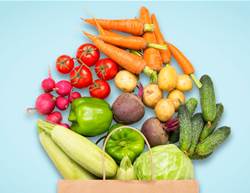Where do you purchase your skincare and hair products?
Just yesterday you were able to stick to three square meals like a civilised human being, but today some animal urge inside is making you devour everything in sight. Yes, it can often feel like your appetite changes on a day-to-day basis. And really, every day can be a little different. Hunger is the result of a complex mix of hormones, physical activity, sleep deprivation and even stress. But it changes over time. Here's what you can expect from your hunger pangs, decade by decade.
In Your 40s
This is the decade when—lucky you!— digestion issues are more likely to show up, says wellness expert Dr Tasneem Bhatia, which will understandably mess with your appetite. But your 40s may also be a decade of slowing down physically. "Appetite typically increases out of proportion to activity level," she says.
Insulin resistance might also start to develop in this decade. When your body doesn't use insulin effectively, sugar can build up in your blood instead of being stored in cells. And if those cells aren't getting their sugar, a.k.a energy, you might feel hungrier, especially for simple carbs, the quickest source of energy.
In Your 50s
For some women, plunging oestrogen levels due to menopause around 50 or 51 can result in a similar pattern of craving more carbs and sugar as if you were insulin resistant, Bhatia says. Perhaps, she hypothesises, this might be the cause of the midlife weight gain so many women face around this time.
Indeed, women's bodies do tend to hold on to a little something extra during this decade, says dietitian Ngaire Hobbins, but it's possible it's a sort of natural defense mechanism against health problems down the road.
In Your 60s and Beyond
Despite what you may have heard, your stomach doesn't actually shrink with age, Hobbins says. But there do seem to be changes to the stretchiness of your tummy that happen alongside ageing that mistakenly tell the brain you're full when you're not, she says, leading some older folks to lose weight as they age.
If you fit that bill, this decade may be the start of a new priority when it comes to weight: keeping it on. Weighing too little as we age has been linked with higher risk of falls and hospital stays. If you're on the slimmer side of things, you can pad meals with a little extra fat, like a generous helping of olive oil or grated cheese on your vegies. "There's a lengthy of list of health concerns that could be underlying such speedy weight loss over 65, so it's worth bringing up with a doc.
You're also more likely in this decade to have started taking medications for various other health conditions, and pills are notorious for messing with appetite. Some change the taste of food; some dry up saliva, making the act of eating simply unappealing; while others zap your hunger pangs entirely.










